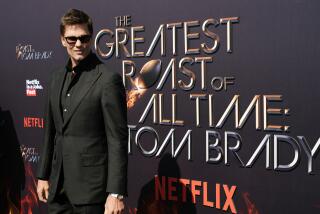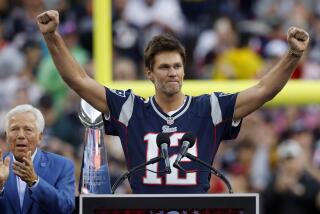Wall Street Assessment of Low-Key Bush Friend Is Mixed : Brady Called a Consensus Builder
- Share via
WASHINGTON — There is at least one thing that people here agree on about Treasury Secretary Nicholas F. Brady: He’s no Jim Baker.
James A. Baker III, who left the Treasury post last summer to run George Bush’s presidential campaign and will become secretary of state in the new Bush Administration, was an inveterate activist, a skillful negotiator in both the back halls of Capitol Hill and the glittery palaces of international finance, and, above all, a consummate political gamesman.
The low-key, old-school Brady, however, a Wall Street fixture who headed the investment bank of Dillon, Read & Co. for years and now occupies Baker’s old post, has so far been happy to stay in the background.
“Washington is a town of huge egos, but this is a man seemingly without one,” said New Jersey Gov. Thomas H. Kean, a moderate Republican who appointed the similarly minded Brady to the Senate in 1982 to fill the unexpired term of former Democratic Sen. Harrison Williams, who was convicted of accepting a bribe in the Abscam scandal. “Nick is a man of utter integrity, hard-working and extraordinarily self-effacing. His instinct will be to make George Bush look good, not himself.”
But with Bush’s announcement Tuesday that he will keep his long-time friend and confidant in one of the key economic policy positions of his Administration, Brady--at 58, graying, slightly stooped and perpetually rumpled in Ivy League flannel--has reached a position in which being a loyal, self-effacing friend may not be enough.
Wall Street Assessment
The office of the secretary of the Treasury is about shaping economic policy for the nation and the world. “He’ll be a great ‘kitchen cabinet’ member,” as one Wall Street source said, “but no one is quite sure whether he’ll make a good Treasury secretary.”
Already it is evident from the shakiness in financial markets that Brady will face a number of difficult tasks, ranging from forging a political deal with Congress to cutting the federal deficit to preventing ailing savings institutions from damaging the nation’s financial structure. He will also have to devise a way to help revive the economies of the shaky democracies of Latin America and elsewhere that are mired deeply in debt.
Many of those who have worked with him in the past are counting on Brady to demonstrate that he has the right stuff for the job.
“I think Nick Brady is just what the doctor ordered,” said Jeffrey Lane, president of Shearson Lehman Hutton, one of Wall Street’s major brokerage houses. “In this business, he is known as one of those people who understands how markets work and what should be done to make them work better.”
Not everyone, though, is convinced that Brady is up to the challenge.
“He’s a guy who’s been floating around the top of the pyramid for years, but without really having made a major impact on anything,” said a Wall Street executive who has worked with Brady in the past. “He’s a delightful man. A great dinner companion and a perfect guy for a President to unwind with,” the executive added, speaking only on condition that he not be identified.
Similarly, Bush’s sister, Nancy Ellis, remarked before the election: “The two certainly get along. I think if George became President, the two of them would always be sneaking off to play tennis.”
There are also those on Wall Street who believe that Brady, while keeping Dillon Read highly respected and profitable, was ineffective in reversing its slide from the top ranks of U.S. investment banks. “Back in the 1960s, Wall Street was still an old-shoe, WASPy kind of place and Dillon Read was at the top of the pack,” said the head of another investment banking firm. “But the business, led by Goldman Sachs, got a lot more aggressive. Some firms made the transition, but Brady was probably a little too genteel, and Dillon Read slipped pretty far down the ladder.”
Brady’s associates, however, say that no one should be fooled by his relaxed approach and unpretentious manner. Brady, Treasury official David Mullins told a reporter earlier this year, “has a unique ability to somehow encourage people to underestimate him.”
Brady, who bears a remarkable physical resemblance to Bush and shares his aristocratic taste for well-worn sweaters and khaki pants on weekends, has had an extraordinarily firm friendship with him for the last 14 years.
The wealthy Brady comes from the same New England blue-blood background as Bush and enjoyed a similar education at Yale. Although Brady entered college a year after Bush left, he already was acquainted with the Bush family because his father and Bush’s uncle had been business associates. He first got to know Bush personally during a vacation in the early 1970s when Bush’s younger brother, Jonathan, brought them together as tennis partners.
The special relationship between the two men was cemented when Brady helped pull Bush through tough times four years ago. The 1984 election was an unparalleled triumph for Reagan, but surprisingly it left Bush discouraged about his future. Dogged by the “wimp” charge and feeling lost in the President’s shadow, he even considered giving up his long quest for the White House.
Revived Bush’s Spirits
At that point, Brady paid a crucial visit to the Bush family compound in Kennebunkport, Me. According to associates, he revived the vice president’s spirits and then started putting together the machinery of the 1988 campaign.
“Brady and Bush are almost clones,” one close friend of both men told The Times earlier this year. “Bush is more outgoing and Brady is more intellectual, but they are very, very similar men.”
Last year Brady told a Times reporter: “I know George Bush as well as any man in the United States. You sit around with him, you find (that) the guy passing the peanuts and not feeding his own face is George Bush. He has that kind of enormous regard for other people.”
People say that the same kind of things about Brady too.
“He is a natural consensus builder,” said James Cotting, chairman of Navistar, the Chicago-based truck manufacturer, who served on the commission headed by Brady that issued a widely respected analysis of last October’s stock market crash and recommended federal regulatory system changes. “He works in a pretty relaxed way and is one of those people who will listen to others and be influenced by them.”
In terms of future policy, Brady recently told lawmakers that “we are on the right course,” but added that he was working on some new approaches and pledged that “by the time the turn of the year comes, the Treasury will have some suggestions of its own.”
So far, however, that work appears to be going slowly.
“It’s all very much an intellectual exercise,” one Treasury official says.
Whatever his eventual views, as Brady tries to become a major player in setting economic policy, he, like everyone else on the new team, must contend with one complicating fact--James Baker, despite his shift to the State Department, is expected to retain significant influence over all aspects of the Bush Administration in the next four years.
Staff writer Barry Bearak contributed to this story.
More to Read
Get the L.A. Times Politics newsletter
Deeply reported insights into legislation, politics and policy from Sacramento, Washington and beyond. In your inbox twice per week.
You may occasionally receive promotional content from the Los Angeles Times.










